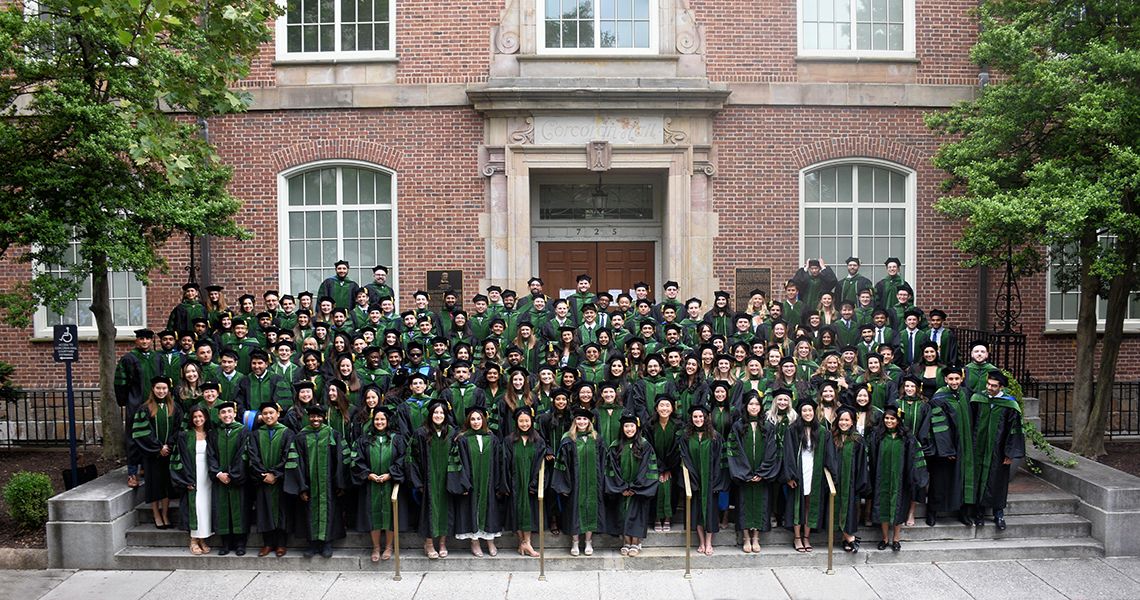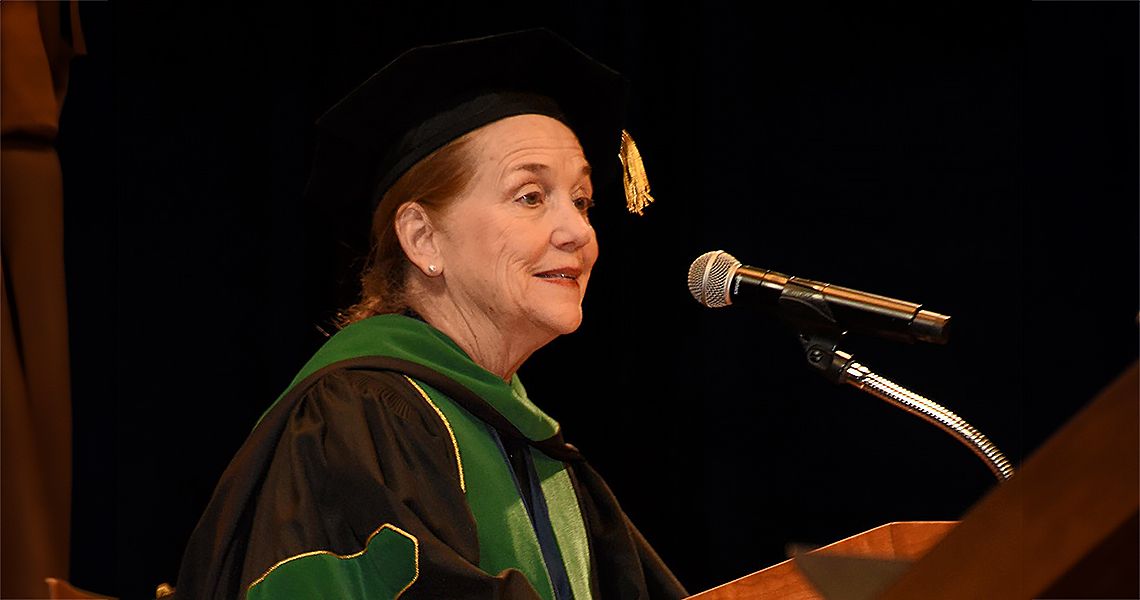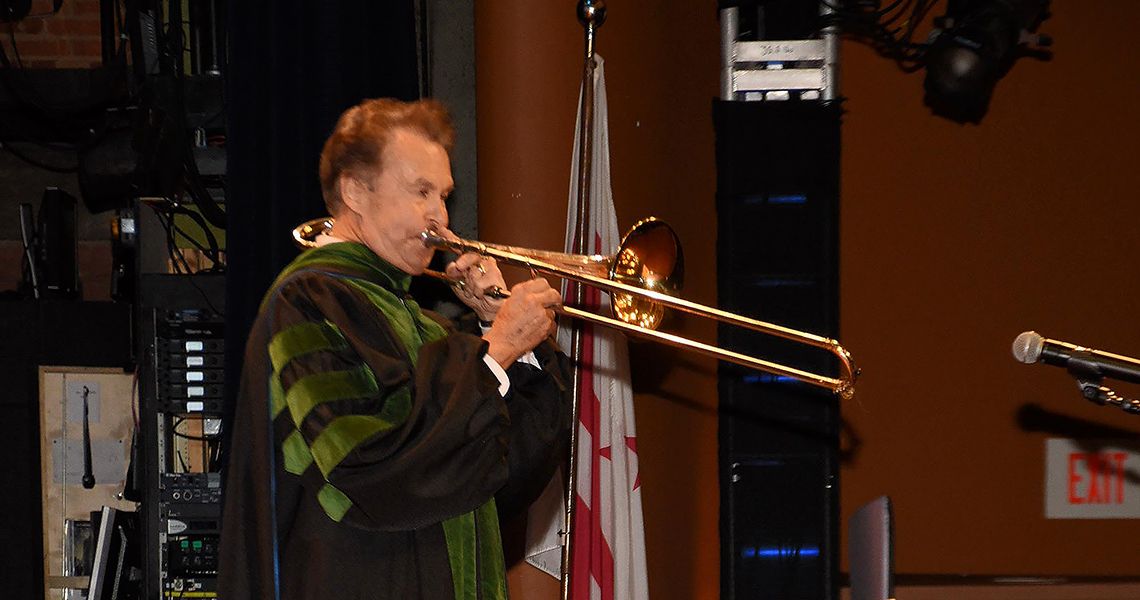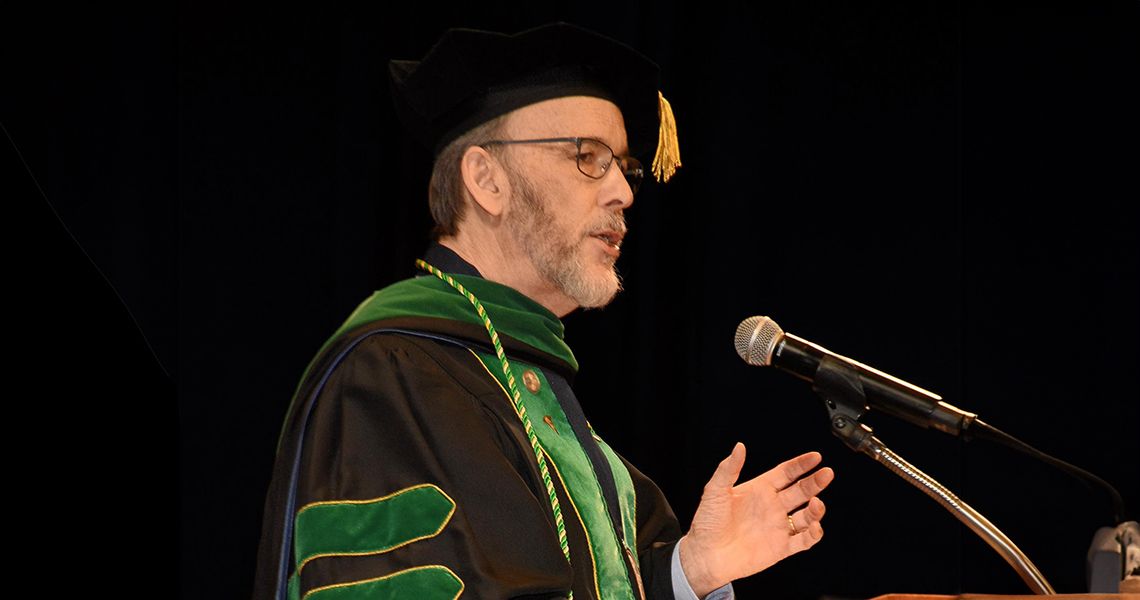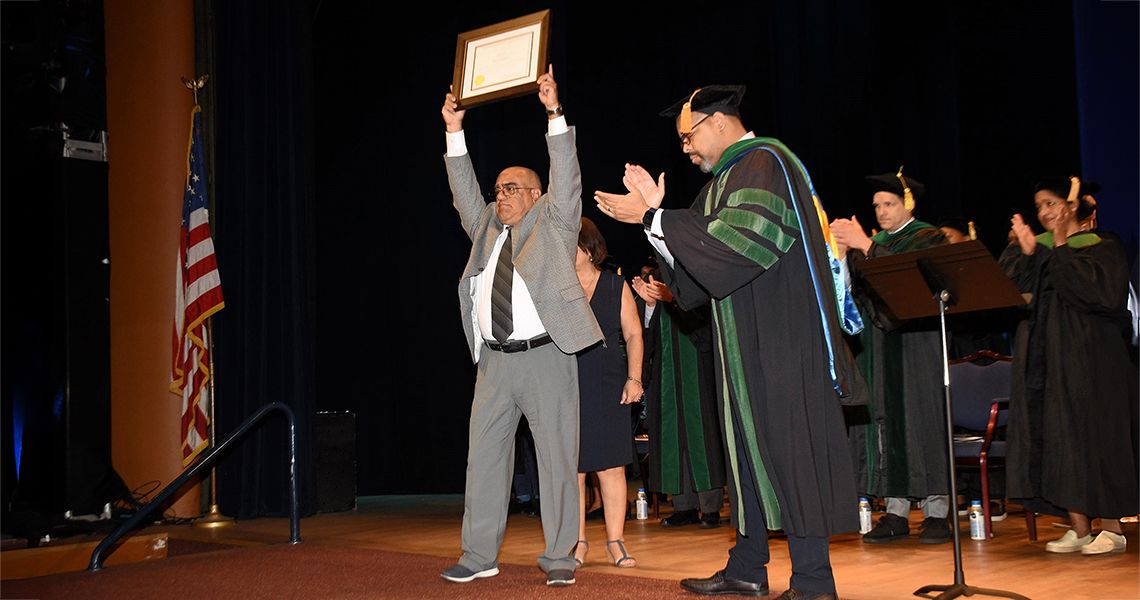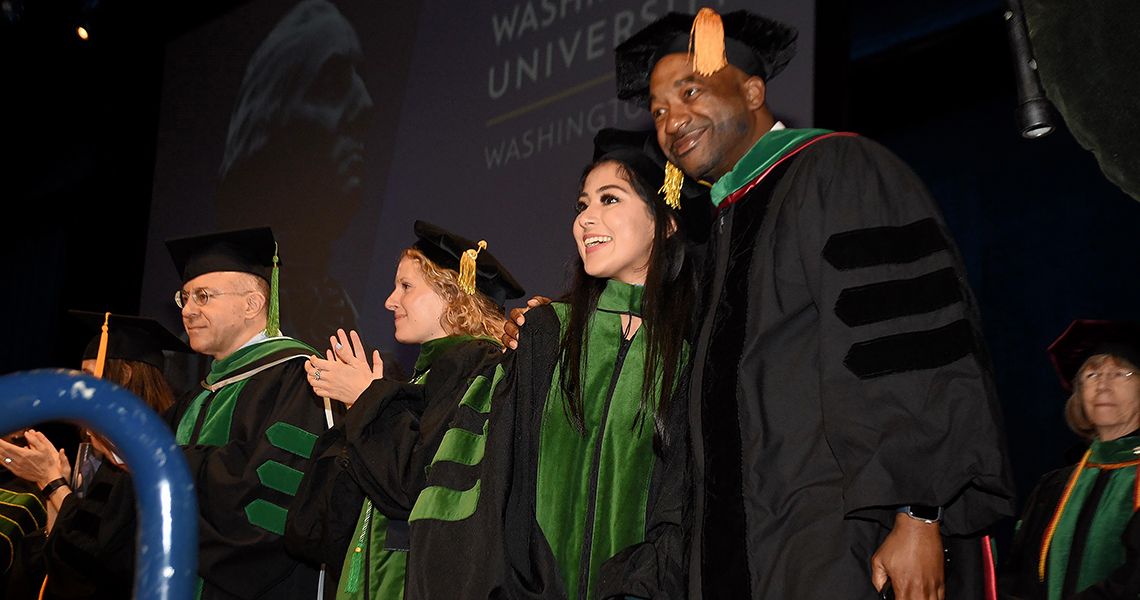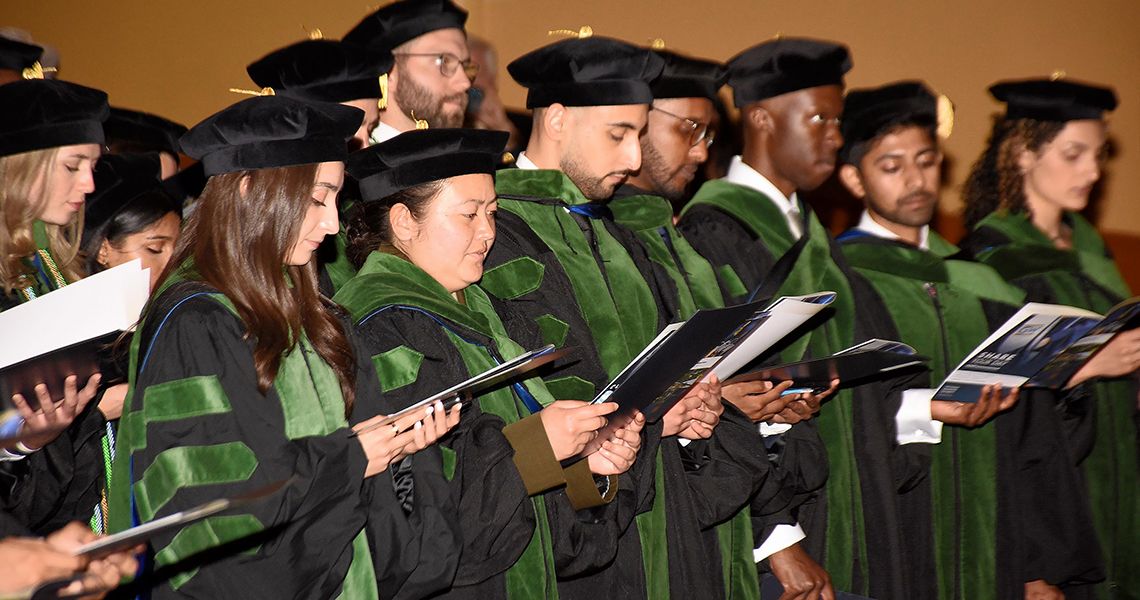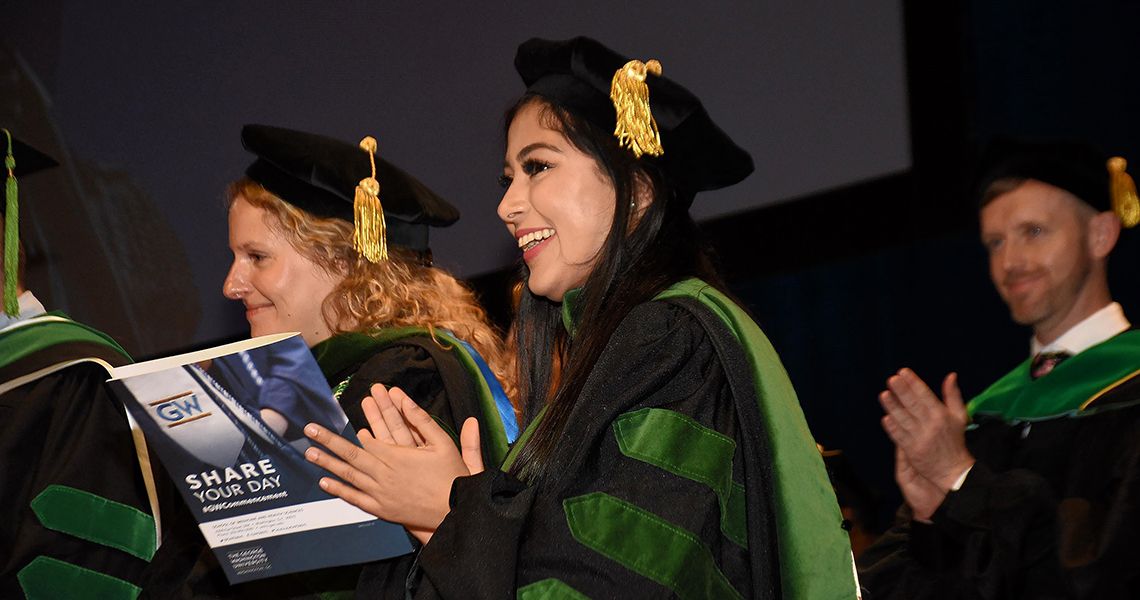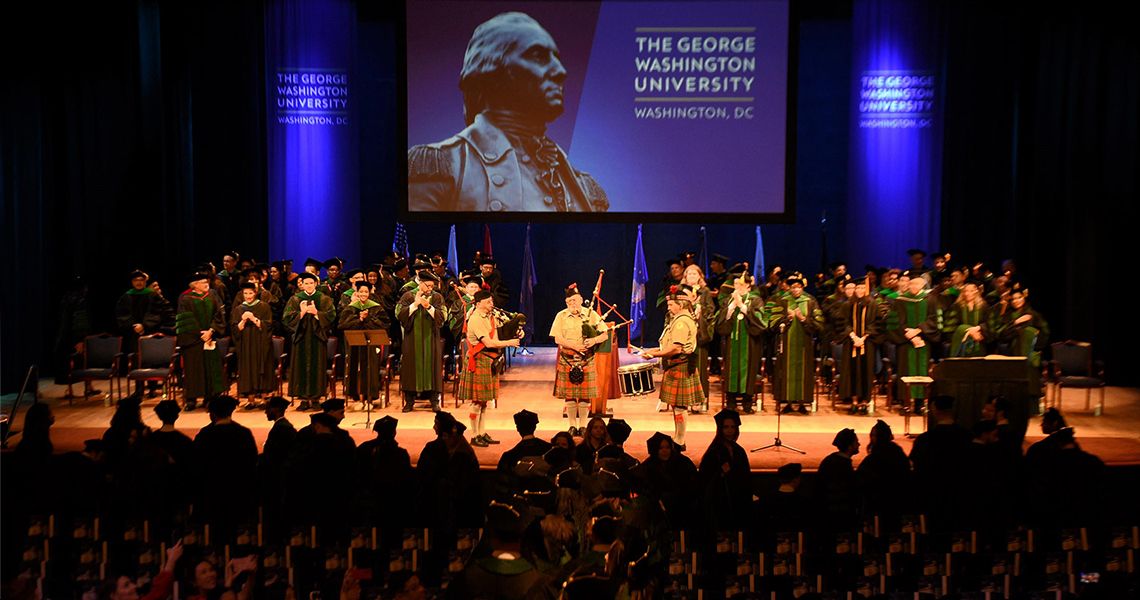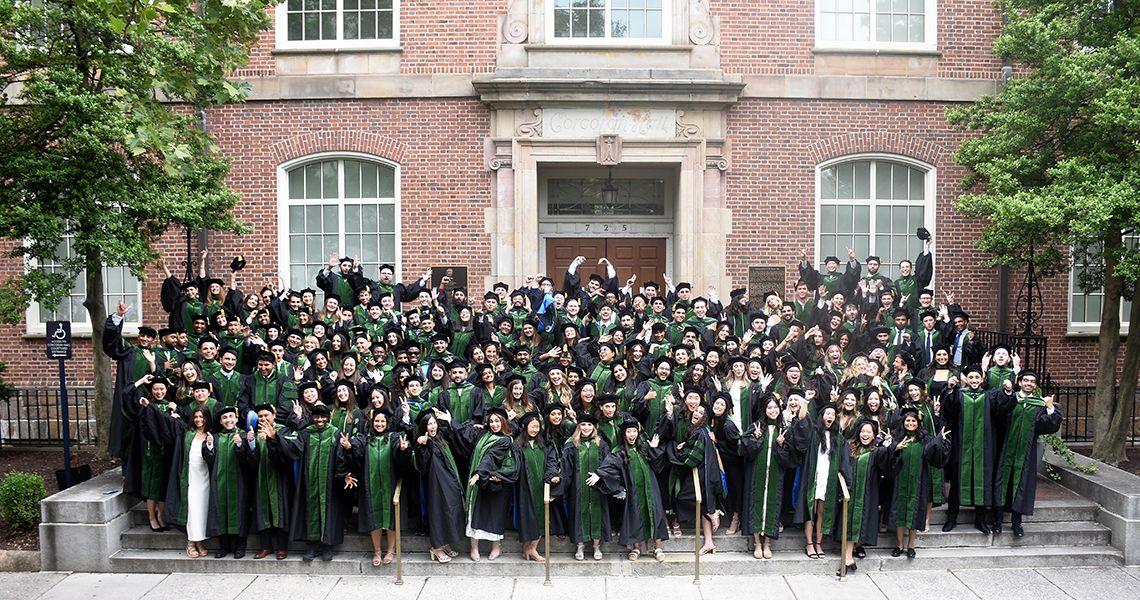Lawrence “Bopper” Deyton, MD ’85, MSPH, Murdock Head Professor of Medicine and Health Policy, and professor of medicine and of health policy and management, offered some sage advice, based on decades of experience, to the members of the George Washington University (GW) School of Medicine and Health Sciences MD program Class of 2024 during the Graduation and Diploma Ceremony, May 19.
“Run toward your fantasies, make your career choices personal, and don’t choose goals because you think it’s what is expected,” he told the graduates and a capacity crowd of family and friends on hand for the ceremony in Lisner Auditorium. It was the first of four rules Deyton developed during his career for a health personal and professional life.
For many of the class, the ceremony marked their first graduation since high school. They arrived on campus in 2020 while the world was still coming to terms with COVID-19, trying to assess the risks and identify an effective response to the pandemic.
Reflecting their auspicious start to medical school, entering in the midst of the worst pandemic in more than 100 years, Barbara Lee Bass, MD, FASC, professor of surgery, Walter A. Bloedorn Chair of Administrative Medicine, vice president for health affairs, and dean of the GW School of Medicine and Health Sciences, celebrated the resilience and fortitude that carried the Class of 2024 to graduation.
“The world changed overnight for all of us, and including for you students who were beginning your time in medical training,” she said.
“It’s been a time of intense awareness for all of us who are in the health care field, of the pledges that we make as physicians, of our solemn mission to provide care for the sick despite the potential hazards to self,” Bass added. “I thank you all for having taken that step during these most difficult times.”
The class is notable for another reason, she continued. “You, the class of 2024, are our bicentennial class. You are a really special group.”
This year marks the start of the GW School of Medicine and Health Sciences Bicentennial Anniversary. On Oct. 19, 1824, trustees of Columbian College, GW’s foundational institution, adopted by-laws and regulations to establish the first medical school in the District of Columbia, and the 11th oldest medical school in this country.
“We’ve been at the forefront of medical education, training generations of compassionate physicians like you for two centuries now,” Bass explained. “Now we get to carry this tradition of incredible excellence and service into the beginning of our third century.”
Class of 2024 Valedictorian Sally Kate Zimmerman was selected to introduce Deyton, the celebration’s keynote speaker. Deyton, she explained, has built an extensive career in health care leadership, research, and clinical positions across federal health and public health agencies including the Food and Drug Administration, Department of Veterans Affairs, National Institutes of Health, the Department of Health and Human Services Office of the Surgeon General, and Assistant Secretary for Health.
Since returning to his alma mater in 2013, he has been instrumental in revolutionizing the school’s MD program by creating the Clinical Public Health curriculum, which now involves courses required for all GW medical students. He was a driving force behind the creation of the GW Culinary Medicine Program and Seva Teaching Kitchen, as well as the creation of GW’s Criminal Justice Health Program, the Clinical Public Health Track Program for trainees in GW’s Graduate Medical Education programs, and revitalizing the Combined MD-Master of Public Health degree program with the Milken Institute SPH.
Rules to Live By
From those experiences, Deyton identified his simple series of axioms for success.
In addition to his first rule of success, he encouraged graduates to “volunteer in your professional as well as your personal life; take your time to do your job well; and actively work to balance your professional and your personal life.”
Deyton illustrated each guiding principle with an example from his personal and professional journey.
Growing up in a clinical family, his fantasy was to become a doctor to make the world a better place. Instead, Deyton deferred that dream and chose a different direction.
“At that time, the medical profession was a very different than it is today. … It was very conservative and, frankly, seemed uninterested in any of the issues I felt were germane to fulfill my fantasies to improve the world,” Deyton recalled.
Following what would become his first “rule,” Deyton shifted course, skipped the MCATS, and sought a career path that might better align with his ideals. That quest led to the Harvard University School of Public Health, where he first studied the public health effects of tobacco use, ultimately focusing his master’s thesis on smoking cessation policies.
The value of volunteerism was his next lesson. As an openly gay man, Deyton became an activist for LGBT health, founding or leading multiple organizations, serving a cause dear to him while also gaining a wealth of experiences and contacts along the way.
Following graduation, he moved to Washington, D.C., where he honed his public health skills, working in health policy for the Surgeon General of the United States. At the start of the Carter Administration, the incoming Secretary of Health and Human Services asked for ideas to improve public health. Deyton volunteered to write a proposal to reduce smoking in the population.
“It looked a lot like my master’s thesis,” he joked, but the new secretary liked the idea, and the proposal became the impetus for what is now the Centers for Disease Control’s Office on Smoking and Health.
As a first-year medical student at GW in 1981, Deyton added a new entry to his list of lessons; take your time to do your job well. Between his class work and his HIV/AIDS advocacy, he soon found himself overwhelmed and struggling academically.
“I learned rule number three,” he explained, “take my time. I stopped trying to do everything all at once, and I focused on learning medicine.”
Following graduation, Deyton moved across the country to pursue HIV/AIDS research and complete a residency in internal medicine at the University of Southern California, LA County Hospital.
“On day one of my internship, I found the Chief of Infectious Disease and the Chief of Hematology, and I volunteered to help with any AIDS research that they were doing,” he recalled. “I gained experience and built my reputation.
Deyton parlayed that reputation and experience into an infectious disease fellowship at the National Institute of Allergy and Infectious Diseases at the National Institutes of Health (under Anthony S. Fauci, MD. The move back to the East Coast enabled him to gain some work-life balance, while supporting national research programs to develop antiretroviral and combination drug protocols that today have turned HIV infection from a death sentence to a treatable chronic disease.
“Now is the time to start building and running toward your next fantasy,” urged Deyton. “You are about to do amazing things. Make those fantasies run towards them.”
Out of Adversity Comes Greatness
Following the hooding and presentation of diplomas, Fatima Anwar, who will serve as an internal medicine resident at GW, gave the student address. She opened her remarks with the words of Alfred, Lord Tennyson and his poem “Ulysses.”
We are not now that strength which in old days
Moved earth and heaven, that which we are, we are;
One equal temper of heroic hearts,
Made weak by time and fate, but strong in will
To strive, to seek, to find, and not to yield.
“I’ve come back to these words so many times throughout my life, and they’ve served as a kind of guiding principle for me,” she told her fellow graduates. “But this passage has never felt more relevant than it does now.”
Much like Tennyson’s Ulysses, Anwar said, the Class of 2024’s journey has been long and arduous.
“We too have been made weak by time and fate,” she said, however, “the adversity we have faced has not only forged resilience, but has also inspired greatness.”
When faced with future obstacles, Anwar pressed her classmates to explore ways in which adversity might spur personal growth.
“Dare to envision greatness, because only then can you achieve it,” she said. “Use adversity to create opportunity, because adversity is an inevitability of life. Stand as pillars of support for one another, because if we stand together, we are never alone.”
Issuing the Charge
To close out the ceremony before the recitation of the Hippocratic Oath, Dean Bass issued her charge to the graduates. She acknowledged that many in the audience would go on to careers as trusted physicians, while others might pursue careers in basic and translational science, or maybe serve as medical educators or lead health care delivery systems.
“I hope you can say that your time here in D.C., and your ‘only at GW’ moments, have made clear to you that each of these roles is a vital part of creating and delivering on our health care mission,” she said. “None of these things — from patient-centered, compassionate care to transformational policies in health care access and delivery — just happens. They happen because of people with passion. People with skills training and a lifelong commitment to stay at the top of their games, who jump in, who lead, who persevere, and who care and do all they can to create an impact and make our people and our communities healthy.
“I charge you,” Bass said, “to step into your future role with passion and energy, whichever of those paths it may be.”
